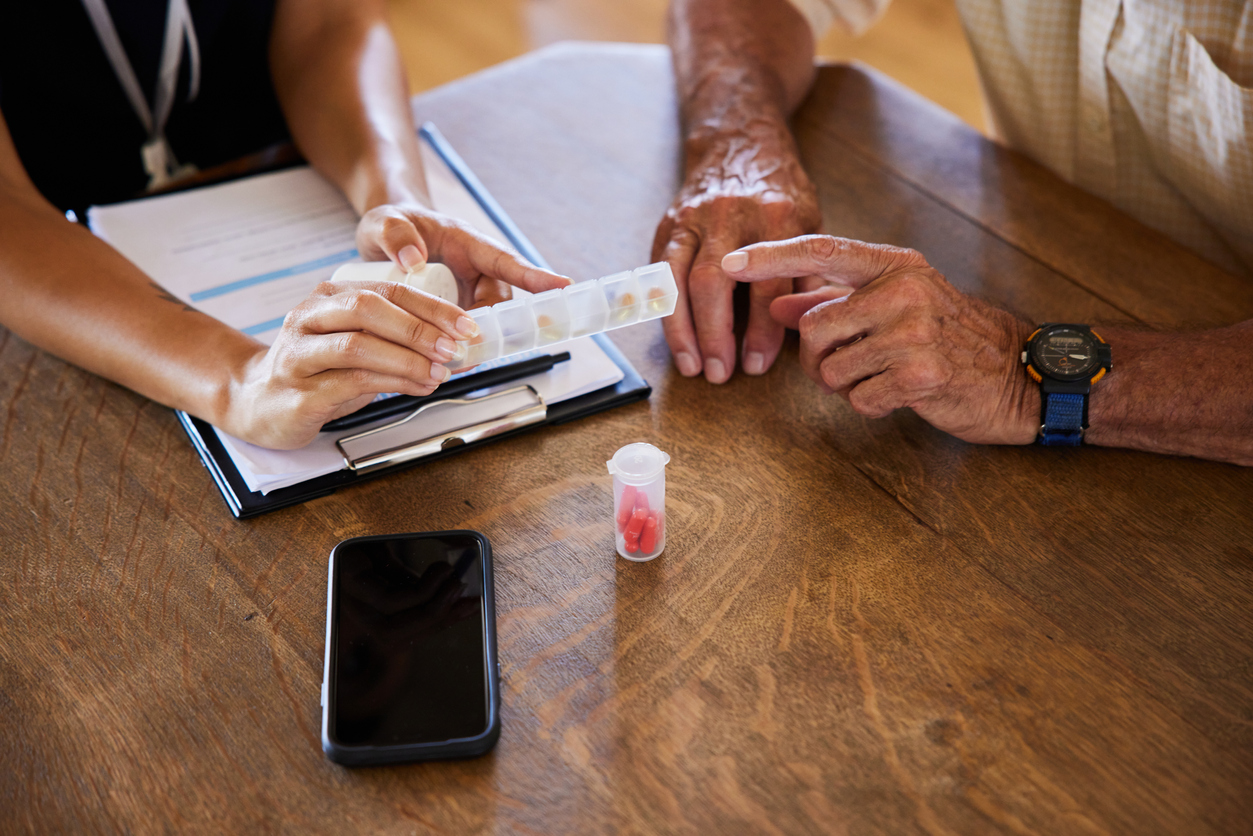In Wales, supporting people to independently manage their health and wellbeing is a priority. Cwm Taf Morgannwg Health Board are currently trialling a digital medication management technology to empower people, improve health outcomes, and work toward streamlining health service delivery across Bridgend.

For many people across the UK, medication is a part of everyday life. Tablets taken at regular intervals stabilise chronic health conditions and can prevent illnesses from worsening.
Medication mismanagement and non-adherence is a problem that impacts around half of regular medication users. Despite its importance, many people can find it challenging to consistently take medication on a day-to-day basis. This becomes more prevalent in older people who may struggle remembering to take medication or have multiple daily doses to manage.
The financial impact amounts to £300 million worth of medicine waste in the UK. Furthermore, it is estimated that 5 – 10% of hospital admissions are medicine related, with 29% of those admissions due to non-adherence.
There are a few options currently available to support people in managing their medication, such as daily calls with carers who visit to help people take medication at the right times. However, these are often time consuming and can cost up to £9 per house call 1.
Other options include reminder clocks and charts, monitored dosage systems, and telecare prompts. However, none of these provide direct feedback to professionals, community members, or family for confirming that the user has successfully accessed their medication.
Identifying health needs and exploring solutions via digital innovation
Cwm Taf Morgannwg University Health Board (CTMUHB) and Bridgend Council recognised a growing need for an innovative medication management system to improve health outcomes. A solution was sought that empowered individuals, increased independence, and provided reassurance to families and carers.
This approach sits within the context of policies such as ‘A Healthier Wales’ (2018), which outlines the need to support people to live better lives through preventing illness, empowering them to manage their health, and enabling them to live independently for as long as possible. It also demonstrates the importance of embracing innovation and maximising use of digital, data, and communication technologies to raise health and social care quality.
CTMUHB and Bridgend Council contacted Life Sciences Hub Wales requesting our support. We collaborated with them through every step of the process for discovering and adopting an innovative solution for medication management.
As Project Lead, I have worked in close partnership with CTMUHB and Bridgend Council, in a project management capacity, providing realistic timescales, cost measurement, objective advice, and crucial expertise.
Life Sciences Hub Wales undertook extensive horizon scanning, identifying the current technology available for medication management2 and proposing a solution meeting the key priorities outlined. We also supported with funding proposals and made sure there was a clear understanding of current need, and what solutions can be provided through adopting digital innovation.
This collaboration has led to CTMUHB and Bridgend Council currently trialling a digital technology called YourMeds. This smart medication management technology acts as a digital pill box, with pods pre-filled by pharmacists and delivered directly to the user.
YourMeds features audio and visual aids to remind the user when the medication is ready to be taken, and a complementary app gives immediate information to care providers and families when medication is accessed. The technology also directly notifies connected individuals to inform them if medication has not been accessed.
Enabling independence and reimagining the future of social care
Digital medical management technology could increase independence for those who rely on medications. Instead of relying on daily calls or telecare prompts, they can access their medication at the appointed times, free from reliance on a carer or family member.
The costs saved from adopting a digital technology instead of daily calls are estimated at around £3,600 per year. Consequently, staff time can be reallocated to other community services.
In supporting individuals with their medicine regimes, digital medication management technology could positively impact hospital admissions. This is supported by NICE, who reported that YourMeds improved consistent medicine adherence, and reduced hospital admissions caused by medicine mismanagement. By reducing the number of crisis referrals, digital technology can be preventative and make sure things stay right.
Digital medical management technology can also help carers to identify people struggling with adherence through app system alerts. This provides important information about need, helping to reorganise workflow, streamline services, and redirect support to where it is most needed.
Digital medication management systems can also be sustainable. As previously stated, medication wastage accounts for £300 million per annum. A digital approach means, there is less room for error and money saved can be reinvested into other key services.
There is also potential impact of digital medication management systems beyond the medicine user. If family members live further away from people managing daily medication, then this technology provides reassurance that medication has been appropriately accessed.
Whilst this project is in its early days, it is clear that a digital approach to medication management can allow people to live independently and have more control over their wellbeing. Digital solutions and innovative approaches are required to ensure everyone can access the care they need - keeping people safe, healthy, and empowered.
If you would like support in the development and adoption of innovation into health and social care services, then please contact hello@lshubwales.com
1 This fee was taken from Bridgend County Borough Council charging rates for a 15-minute care call to support with medication. Cwm Taf Morgannwg University Health Board also commission for care calls if there is a medication only need, quoting around £9 per medication only care call. However, private care costs can sometimes be much higher than this depending on the independent care provider.
2 Intelligence report: Technologies to support medication adherence

